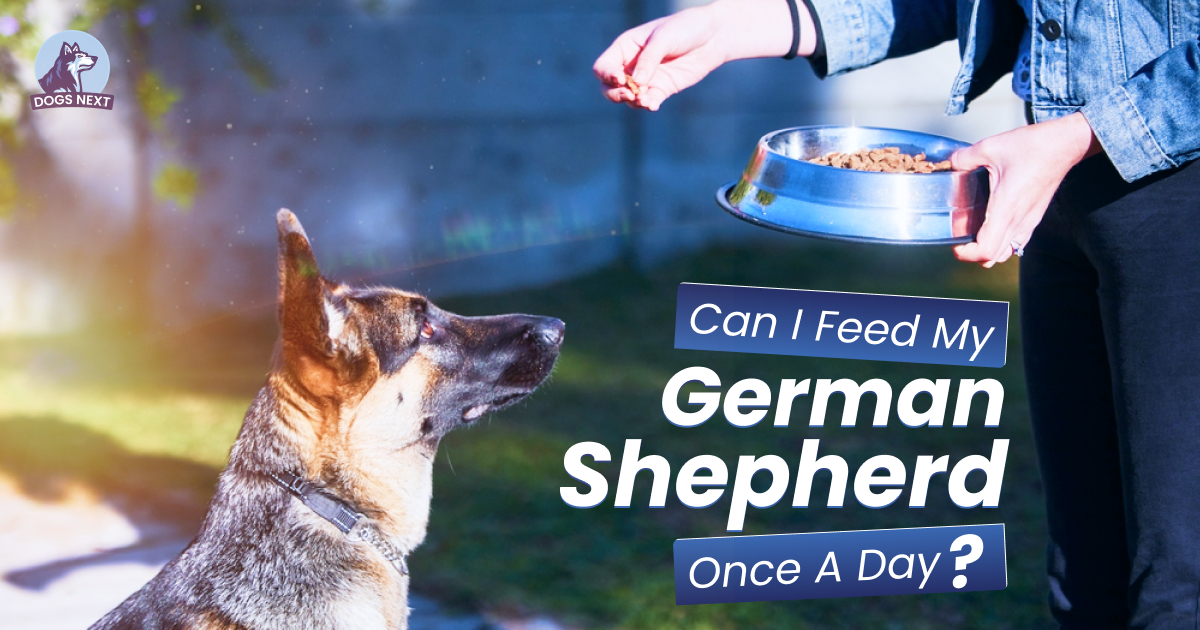As a German Shepherd owner, you want to ensure that your furry friend is well-fed and healthy. One question that often arises is whether it’s okay to feed your German Shepherd once a day. Yes, they can eat once a day. In this article, we’ll explore the pros and cons of feeding your dog once a day, as well as important factors to consider when deciding on a feeding schedule.
We’ll discuss the potential advantages of feeding your German Shepherd once a day, such as saving time and money, as well as the potential drawbacks, including hunger, overeating, and gastrointestinal problems.
Finally, we’ll provide tips on factors to consider, such as age, activity level, and health conditions, so that you can make an informed decision about your German Shepherd’s feeding schedule.
Table of Contents
Nutritional Needs of German Shepherds
All dogs deserve healthy, nutritious, and satisfying food, but generic “dog food” isn’t going to be right for most of them. Every breed has its own special dietary needs.
Small dogs, for example, need something different than our big, hard-working GSDs. For maximum health and energy, keep these things in mind when deciding what to feed your German Shepherd.
Size Considerations
German Shepherds can be as tall as 26 inches at the shoulder. While males can be around 66 to 88 pounds, females fall into the 49 to 71-pound range.
Don’t just stuff your dog full of the cheapest thing you can find—go for the quality products.
Age Considerations
With such a large body and high energy level, it’s imperative that you provide your GSD with appropriate nutrition levels at each stage of development.
These dogs grow fast, so they’ll need specific nutrients provided at specific times in their lives.
Puppies will need different nutrients—such as protein and calcium—than a senior GSD, for example.
Be sure whatever you’re feeding your German Shepherd is not only high-quality and healthy, but it should also be suitable for the age of your dog.
Activity Level
Just as activity level affects how much humans should eat, so too does it affect dogs. As a working breed, German Shepherds are active, muscular, and agile.
All of these aspects contribute to a higher caloric need and should be addressed through the feeding of a high-quality diet. To put this into perspective, a professional human athlete would not subsist entirely on fast food burgers and soft drinks.
These high-fat and sodium foods do not provide the variety of nutrients these athletes need to perform at top capacity. Cheap, fatty, highly-processed foods produce a sluggish body and mind. The same goes for German Shepherds.
If you want your dog to perform well and stay healthy, you can’t feed them the equivalent of fast food burgers and soft drinks in the form of cheap, generic dry kibble every day.
Health Considerations
Because this breed is prone to a handful of health issues, it’s important to understand each issue and begin preventative treatments through a healthy diet.
It’s always better to try preventing problems right from the start rather than waiting until they crop up and trying to treat them. One such health issue that may be prevented or mitigated by diet is arthritis, often caused by hip or elbow dysplasia.
Since this is generally an inherited predisposition, you may not be able to fully prevent it from happening, but starting with an excellent diet and maintaining it throughout your dog’s life has a good chance of helping.
Several musculoskeletal disorders can cripple your GSD if you don’t take appropriate precautionary measures right from day one.
Pros of Feeding Your German Shepherd Once a Day
Time and Convenience
Feeding your German Shepherd once a day can save you time and make it more convenient to manage your pet’s meals. With one feeding time per day, you don’t have to worry about preparing and serving multiple meals throughout the day, which can be especially helpful for busy pet owners.
Cost Savings
Feeding your German Shepherd once a day can also save you money on food costs. Rather than buying multiple bags of food per day or feeding your dog expensive wet food, you can stick to one large meal of high-quality kibble, which can be more cost-effective in the long run.
Weight Management
By feeding routinely a single meal to your German Shepherd, you can help manage their weight more effectively. With a single feeding, you can better control the portion sizes and ensure that your dog is getting the appropriate amount of food for their age, size, and activity level.
Regular Digestion
Feeding your German Shepherd single a day can also promote regular digestion. By giving your dog a consistent feeding schedule, their body can better regulate and anticipate when food is coming, which can lead to more regular bowel movements and reduce the risk of constipation or other gastrointestinal problems.
Reduced Risk of Bloat
Bloat, or gastric torsion, is a serious and potentially life-threatening condition that can occur in large and deep-chested breeds like German Shepherds. By feeding your dog once a day, you can reduce the risk of bloat by allowing their stomach to empty fully between meals, which can prevent gas buildup and twisting of the stomach.
Cons of Feeding Your German Shepherd Once a Day
Hunger and Overeating
Feeding your German Shepherd once a day can lead to feelings of hunger and overeating. With only one meal per day, your dog may be more likely to eat too much food at once, which can lead to discomfort, bloating, and even vomiting.
Gastrointestinal Problems
Feeding your German Shepherd once a day can also increase the risk of gastrointestinal problems, such as diarrhea or constipation. With a large meal, your dog’s digestive system may have trouble processing all the food at once, leading to digestive upset.
Changes in Energy Levels and Behavior
Feeding your German Shepherd once a day can also lead to changes in energy levels and behavior. Your dog may become more lethargic after a large meal or more anxious and restless as they anticipate their next meal. This can lead to changes in behavior or mood that may be disruptive to your household.
Difficulty with Training
Feeding your German Shepherd once a day can also make it more difficult to train your dog. With only one meal per day, your dog may be more focused on food and less responsive to training cues or commands. It will take more time than usual to train how to haul.
Health Risks for Certain Dogs
Feeding your German Shepherd once a day may not be appropriate for all dogs, especially those with certain health conditions.
For example, dogs with diabetes or other metabolic disorders may require multiple smaller meals throughout the day to regulate their blood sugar levels. It’s important to consult with your veterinarian before making any changes to your pet’s feeding schedule.
Factors to Consider When Deciding on Feeding Schedule
Some factors to consider when deciding on your German Shepherd’s feeding schedule:
Age
Puppies require more frequent feeding than adult dogs, typically 3-4 times a day. As your German Shepherd grows older, their feeding schedule can gradually be reduced to once or twice a day.
Activity Level
Highly active German Shepherds may require more cups of food or frequent feeding to maintain their energy levels, while less active dogs may do well with one or two larger meals per day.
Weight and Body Condition
Overweight or obese dogs may benefit from more frequent, smaller meals to help control their weight. Similarly, dogs with certain health conditions may require specialized feeding schedules to maintain their health.
Personal Preferences
Your own personal preferences and schedule may also play a role in determining your dog’s feeding schedule. Some owners may prefer to feed their dogs once a day for convenience or other reasons, while others may prefer multiple smaller meals.
Food Type and Quality
The type and quality of food you feed your German Shepherd can also impact their feeding schedule. For example, dogs on a raw food diet may require more frequent, smaller meals to properly digest their food.
Additionally, some commercial dog foods may be formulated for specific feeding schedules, so it’s important to read and follow the manufacturer’s instructions.
Veterinary Advice
Ultimately, the best feeding schedule for your German Shepherd should be determined in consultation with your veterinarian. Your vet can guide appropriate feeding schedules based on your dog’s individual needs and health status.
General Rules and Feeding Guidelines for German Shepherd
Here are some general rules to follow for feeding your German Shepherd:
Choose high-quality food
Your German Shepherd’s diet should consist of high-quality dog food that is appropriate for their age, activity level, and health status. Look for food that lists meat as the first ingredient, and avoid fillers and artificial preservatives.
Follow feeding instructions
Read the manufacturer’s instructions on the food package to determine the appropriate feeding amount for your German Shepherd based on their weight and age. Measure out the food to ensure that you are providing the correct amount, and avoid overfeeding.
Feed at regular times
Establish a regular feeding schedule for your German Shepherd, and stick to it as much as possible. Dogs thrive on routine, and feeding at regular times can help maintain their digestive health and prevent overeating.
Provide fresh water
Make sure that your German Shepherd has access to fresh, clean water at all times. Change the water frequently, and wash the water bowl regularly to prevent bacterial growth.
Avoid feeding table scraps
Table scraps and human food should be avoided when feeding your German Shepherd, as they can lead to digestive upset and obesity. Stick to balanced, high-quality dog food to meet your dog’s nutritional needs.
Monitor your dog’s weight
Regularly monitor your German Shepherd’s weight and body condition to ensure that they are maintaining a healthy weight. Adjust their feeding schedule and amount as needed to prevent obesity or other health problems.
Consult with your veterinarian
Always consult with your veterinarian before making any major changes to your German Shepherd’s diet or feeding schedule. Your vet can guide appropriate feeding practices based on your dog’s individual needs and health status.
Frequently Asked Questions
Q: Is it OK for a German Shepherd to eat once a day?
Ans: It depends on the individual dog’s needs and lifestyle. Feeding a German Shepherd once a day can have both pros and cons, so it’s important to consider their circumstances before deciding on a feeding schedule.
Q: Should I feed my GSD once or twice a day?
Ans: The number of times you should feed your German Shepherd per day can vary depending on their age, activity level, and overall health. In general, most adult dogs do well with two smaller meals per day, while puppies and seniors may require more frequent feedings.
Q: What times should you feed your German Shepherd?
Ans: Establishing a regular feeding schedule can help maintain your German Shepherd’s digestive health and prevent overeating. Choose a schedule that works for both you and your dog, and try to stick to consistent feeding times each day.
Q: Why is my German Shepherd only eating once a day?
Ans: There could be several reasons why your German Shepherd is only eating once a day, including illness, stress, or a change in their environment. If your dog’s eating habits have suddenly changed, it’s important to consult with your veterinarian to rule out any underlying health issues.
Conclusion
Feeding your German Shepherd once a day can have both advantages and disadvantages, and there are several important factors to consider when deciding on a feeding schedule. Ultimately, the decision on how often to feed your dog should be based on their individual needs, lifestyle, and health status.
By following general feeding rules and consulting with your veterinarian, you can ensure that your German Shepherd is getting the nutrition they need to maintain its health and well-being. Remember, a healthy diet is essential for a happy, active, and long-lived German Shepherd.

I’m David, an expert contributor and writer, with two furry friends of my own, I know the challenges of raising and caring for dogs. From training to nutrition and health, my goal is to provide valuable insights and advice to help create strong bonds and happy, healthy lives. Find me in Twitter.




